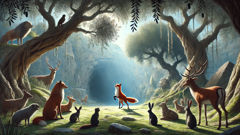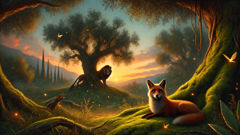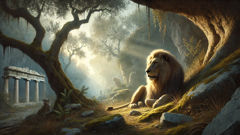Introduction
In the heart of ancient Greece, where marble temples rose above the olive groves and myth seemed to pulse through every shadowed glade, the great forests sprawled across the hills in wild abundance. Light danced in shafts through canopies of oak and laurel, dappling the mossy ground where animals crept in cautious patterns—each attuned to the music of survival. The lion, once the undisputed monarch of these woods, had grown old. His golden mane was streaked with gray, his shoulders hunched and gaunt. Once, his roar sent tremors through the land, scattering antelope, boar, and hare alike; but now, only a tired rasp shivered in his throat. He watched the world from the gloom of his cave, longing for the strength that had defined his youth.
Each dawn, the forest awoke with a chorus of birdsong and the delicate scurrying of feet, but the lion’s hunger gnawed at him. No longer could he chase or pounce; the years had stolen his agility, leaving him with wit and memory as his companions. The other animals sensed his weakness. They passed his den with wary glances, their instincts sharpened by generations of caution. Yet, the lion, though diminished, was not without cunning. His mind—honed by decades of rule and rivalry—sought a new path to survival. Where might falter, he reasoned, guile could prevail.
So it was that whispers began to ripple through the woods: the lion was sick, mortally so. Word spread from the nimble hare to the stately stag, from the boar rooting in the undergrowth to the owl peering from a high branch. The animals felt a mix of relief and curiosity; the threat was fading, but so too was a force of nature that had shaped their world. And in this space between fear and fascination, the stage was set for a lesson the forest would never forget—a tale of deception, observation, and the kind of wisdom that grows from watching the world with clear, patient eyes.
The Lion’s Scheme
Rumors swirled like wind through the underbrush: the lion—the mighty king of these wild lands—was dying. It was the magpie who first carried the news, her sharp eyes having spotted the lion sprawled at the cave’s entrance, chest heaving, mane tangled with leaves. She told the fox, who told the rabbit, who whispered it to the field mouse. Soon, the entire forest buzzed with nervous excitement. Some creatures felt emboldened, venturing closer to the lion’s lair than they’d ever dared before, marveling at the sight of him so diminished. Others kept their distance, suspecting that an apex predator’s weakness was never to be trusted outright.

Inside his cave, the lion listened to every murmur that reached his ears. He watched the patterns of the animals, how they skirted the clearing, their steps lighter than usual. That night, as silver moonlight painted the leaves in shifting patterns, the lion hatched a plan born from desperation and cunning. If brute force could no longer fill his belly, perhaps cleverness could.
He began his performance at dawn. The lion dragged himself to the mouth of his cave and collapsed theatrically, groaning with each breath. His golden eyes shone with feigned pain. When the first animals approached, he called out in a weak, sorrowful voice: “Friends, come closer. I am ill and fear my time is near. Will you not comfort me in my hour of need?”
A trembling rabbit crept near, sympathy etched in her quivering whiskers. The lion beckoned her further, deeper into the gloom of his lair. “I am so lonely,” he whispered, “and your kindness would ease my suffering.” The rabbit, heart pounding, edged closer. In a flash, the lion’s jaws snapped shut, and the cave grew quiet once more.
One by one, animals fell for the ruse. The deer entered with hesitant steps, lured by a mix of pity and the intoxicating notion that the age-old threat was finally tamed. The boar came, the squirrel, even a wise old owl—each drawn in by the lion’s pitiful groans. None returned. The forest soon grew uneasy. Fewer and fewer creatures emerged from the lion’s clearing, but the lion’s hunger was sated for the first time in weeks.
It was the fox, cleverest of all the woodland’s denizens, who sensed something amiss. She watched the lion’s cave from the tangled safety of a bramble thicket, her amber eyes narrowing as she noted the nervous hush that had descended over the animals. The fox had heard tales of the lion’s glory days. She knew that a predator, no matter how weakened, remained dangerous if desperate.
The next morning, as the pale light crept over the hills, the fox made her way to the cave. She paused at the edge of the clearing, surveying the scene with quiet intensity. The lion lay inside, moaning and coughing so convincingly that even the magpie—watching from above—almost believed it. But the fox was not easily fooled. She circled the clearing with deliberate steps, examining every detail: the tracks on the dust, the scuff marks in the moss, the faint scent of fear in the air. She saw that many pawprints and hoofprints led toward the cave’s mouth—but none led away.
The Fox’s Wisdom
The fox paused at a safe distance, her tail flicking in agitation as she weighed her options. The silence pressed in around her, broken only by the gentle sough of the wind through the trees and the distant caw of a crow. She crouched and examined the tracks more closely: the deep impressions of deer hooves, the dainty prints of rabbits, even the scrapes left by a nervous boar—all heading in, none coming out. The evidence was as clear as sunlight on stone.

With careful steps, she circled the perimeter, never setting foot within the shadow cast by the cave’s mouth. The lion, sensing her presence, summoned his best performance yet. “Dear fox,” he wheezed, “have you come to see me in my last hours? I am so very weak—perhaps you might sit by my side and comfort me?”
The fox met his gaze, her eyes bright and unblinking. She answered with a voice as smooth as olive oil and twice as slick: “My good lion, I would gladly pay you a visit, but I see all too well that many have entered your cave—and none have left. I fear your illness is not the only danger that lurks within.”
For a moment, there was silence. The lion’s ruse lay exposed, the web of lies torn apart by a simple observation. His eyes narrowed. The performance was over. The fox, however, did not flee. Instead, she lingered just beyond reach, her mind working. She addressed the other animals—those who watched from the forest’s edge, curiosity mingling with fear.
“Wisdom is the surest shield,” she declared, her voice carrying through the hush. “Let us learn from what we see, not merely from what we are told.”
The owl, perched on a branch above, nodded in agreement. The magpie cackled with delight. The rabbit, trembling in the undergrowth, felt a glimmer of hope.
The lion slunk deeper into his cave, hunger gnawing at him once more. His trick had served him for a time, but the lesson spread faster than fear. Animals learned to trust their own senses—to observe, to question, to look for signs where words and appearances could deceive.
From that day onward, the clearing near the lion’s cave was avoided by all but the bravest and most foolhardy. The fox became a quiet legend among her kin, an emblem of cleverness and caution. The lion, too, was spoken of—but as a cautionary tale: a reminder that power fades, and only wisdom can endure when strength is lost.
Echoes Through the Forest
Seasons shifted in their ancient rhythm, and the story of the sick lion and the wise fox became woven into the tapestry of the forest. The sun traced its arc across the sky; olives ripened and fell; wildflowers burst into bloom and faded. Yet the memory of that fateful day lingered like a scent on the breeze.

The fox’s reputation grew. Among her kin and throughout the animal world, she was held in high regard—not for her swiftness or strength, but for her discernment. Mothers told their kits of her caution; elders reminded their flocks to trust what they could see and not be lulled by honeyed words. Birds carried the tale from grove to grove, their songs mingling with the rustle of leaves and the burble of distant streams.
The lion’s cave grew over with moss and shadow. Rarely did he venture out now, knowing his secret was discovered. Hunger made him leaner still, but even in his solitude he pondered what had transpired. He’d relied on fear and trickery, believing that his legacy was one of raw strength; yet it was the fox’s wisdom—her refusal to be blinded by appearances—that changed the very order of things.
One twilight, the fox returned to the clearing. She sat at its edge, watching fireflies drift through the dusk. From within the cave came a hoarse whisper—once a roar, now a memory. The lion called out, no longer in pretense but with genuine regret. “Fox, what will become of me now? My time as king is over.”
The fox sat in silence for a moment, then replied, “Even kings must yield to time. But those who learn from their failures may yet find peace.”
The old lion lowered his head. “I thought cunning was enough.”
The fox shook her head gently. “Cunning without wisdom is like a net with holes—easy to see through if you look closely.”
From then on, a quiet respect grew between the fox and the lion. She would visit sometimes at sunset, sitting just outside his den to share news of the forest. They spoke of days gone by, of victories and losses, of mistakes and lessons. And in these conversations, a new understanding took root: that true power is not in domination or deception, but in the ability to learn and adapt.
The younger animals watched these meetings with awe. They saw that even the greatest could change. They learned that humility was not weakness, that listening and observing could save lives.
When at last the lion passed away—his bones left to rest in the deep shade of his cave—the forest did not rejoice nor mourn, but remembered. The fox stood guard for a night, then vanished into the undergrowth. And so the tale passed into legend, a living lesson for every creature who ever set paw or hoof upon the ancient, sunlit hills of Greece.
Conclusion
And so, deep in the shadowed groves of ancient Greece, wisdom triumphed where force and trickery had failed. The animals remembered the lesson written in dust outside the lion’s lair: that appearances can deceive, and only those who look beyond the surface will see true danger—or opportunity. The fox’s legacy endured in every rustling leaf and whispered tale among the animals. Her story reminded them that survival was not merely a matter of strength or speed, but of clear-sightedness and courage to trust their own judgment. And as each new generation explored the forest’s sunlit glades and hidden caves, they carried with them the knowledge that careful observation and wise choices could shape their destiny just as surely as any king’s roar.













